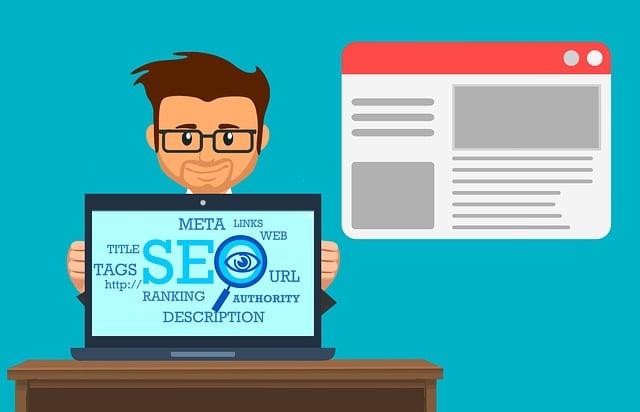Local SEO for small businesses is a powerful strategy that boosts online visibility within specific geographic areas, driving growth and customer engagement. Key tactics include claiming and optimizing business listings on platforms like Google My Business, Yelp, and Facebook, using location-based keywords in content, and encouraging customer reviews. Mastering keyword research helps identify local keywords, while creating engaging location-specific content establishes relevance. Building quality backlinks from local authoritative sites further strengthens SEO efforts. Effective review management leverages positive testimonials as social proof, setting businesses apart from competitors.
In today’s digital landscape, boosting local search rankings is paramount for small businesses aiming to thrive. With competition intensifying, understanding and implementing effective Local SEO strategies can mean the difference between visibility and obscurity. This article guides you through crucial components of Local SEO for Small Businesses, from optimizing business listings and keyword research to creating compelling content, building backlinks, and leveraging reviews. Discover how these tactics can elevate your online presence and attract more local customers.
Understanding Local SEO and Its Significance for Small Businesses

Local Search Engine Optimization (SEO) is a powerful strategy that specifically focuses on improving online visibility for local businesses within their target geographic areas. It’s crucial for small businesses to understand and embrace Local SEO as it offers immense potential for growth and customer engagement. By optimizing their online presence for local search, these businesses can attract nearby customers actively searching for products or services in their region.
For small businesses, Local SEO is significant because it helps them compete with larger corporations that often have more extensive resources. It enables local businesses to claim and optimize their Google Business Profile listings, ensuring their information appears accurately and prominently in local search results. Additionally, Local SEO encourages the use of location-based keywords, customer reviews, and local content creation, all of which contribute to building trust and credibility with potential customers in their community.
Optimizing Your Business Listings: Claim and Verify Your Listings on Key Platforms

Claiming and verifying your business listings on key platforms is a crucial step in optimizing your local SEO for small businesses. With a majority of consumers relying on online reviews and search results to find local services, ensuring your business appears accurate and up-to-date across various listing sites is vital. Google My Business, Yelp, Facebook Pages, and industry-specific directories are just a few examples where you should establish a strong presence.
When claiming these listings, make sure to fill out all relevant information, including accurate category placements, detailed descriptions, and high-quality images. Regularly updating this content with promotions, events, or changes in business hours can also signal to search engines that your business is active and engaged, further enhancing your local rankings.
Mastering Keyword Research for Local Searches

Mastering keyword research is a cornerstone of effective Local SEO for small businesses. It involves understanding how potential customers in your area search for products or services like yours. Tools like Google Keyword Planner, SEMrush, and Ahrefs can help uncover relevant keywords with high local search volume but low competition. This process allows you to target specific terms such as “plumbers near me” or “best cafes in [your city]” that are likely to be used by your target audience when looking for local businesses.
By incorporating these targeted keywords into your website content, including meta tags, headings, and even image alt text, you can improve your site’s visibility in local search results. It’s also crucial to optimize your Google My Business profile with accurate business information, as this plays a significant role in local SEO rankings. Regularly updating your listings and engaging with customers through reviews can further enhance your online presence and attract more local traffic.
Creating Engaging, Location-Specific Content

Creating engaging, location-specific content is a powerful strategy in Local SEO for Small Businesses. This involves crafting material that resonates with your target audience within a specific geographic area. By incorporating local keywords and references, you signal to search engines that your business is relevant and dedicated to that community. This not only boosts visibility on local search results but also fosters a connection with potential customers who are looking for services or products in their vicinity.
When developing location-specific content, it’s essential to go beyond mere mention of your address. Share stories, events, and insights that reflect the unique character of the area. Use local landmarks, neighborhoods, and cultural events as inspiration for blog posts, social media updates, and marketing materials. This not only enhances your SEO efforts but also positions your business as an integral part of the community it serves.
Building Quality Local Backlinks

Building quality local backlinks is a cornerstone of effective Local SEO for small businesses. These links from relevant, authoritative local websites act as votes of confidence in your business’s online presence, signaling to search engines that your site is valuable and trustworthy within your specific geographic area. When crafting a link-building strategy, focus on securing mentions and links from industry-specific directories, community forums, local blogs, and partner businesses operating within your niche.
Engaging with these platforms not only opens doors for earning backlinks but also fosters genuine connections within your community. Local influencers and industry leaders can become valuable allies in this process, as their endorsement through backlinks carries significant weight with search algorithms. Additionally, encourage satisfied customers to leave positive reviews on relevant local review sites, which not only bolsters your credibility but also serves as a powerful, organic link-building strategy for your small business.
Leveraging Reviews and Ratings to Boost Credibility

In the realm of Local SEO for Small Businesses, leveraging reviews and ratings stands out as a potent strategy to enhance credibility and attract more customers. Positive customer reviews act as social proof, establishing trust and assurance among prospective clients. By encouraging satisfied patrons to share their experiences on platforms like Google My Business, Yelp, or industry-specific directories, businesses can significantly boost their online presence.
These reviews and ratings not only provide valuable feedback but also serve as powerful signals to search engines, indicating the quality and reputation of a local business. Search algorithms increasingly factor in customer testimonials when determining local rankings, making it crucial for small businesses to actively manage and optimize their online reviews. A robust review profile can help differentiate a company from its competitors, ultimately driving more relevant traffic and fostering long-term growth.
